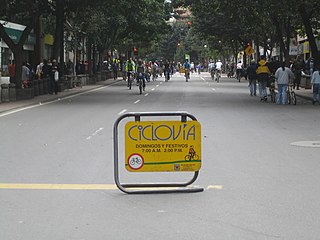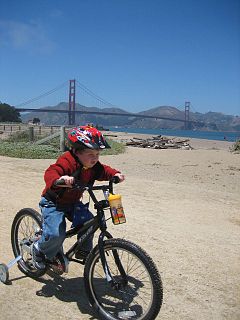
Critical Mass is a form of direct action in which people meet at a set location and time and travel as a group through their neighbourhoods on bikes. The idea is for people to group together to make it safe for each other to ride bicycles through their streets, based on the old mantra: there's safety in numbers.

Bicycle Network is a charity, one of the largest cycling membership organisations in the world, whose mission is to have More People Cycling More Often. It was, prior to 2011, known as Bicycle Victoria.
Interstate 405 (I-405), also known as the Stadium Freeway No. 61, is a short Interstate Highway in Portland, Oregon. It forms a loop that travels around the west side of Downtown Portland, between two junctions with I-5 on the Willamette River near the Marquam Bridge to the south and Fremont Bridge to the north.

The Sunset Transit Center is a TriMet bus transit center and light rail station on the MAX Blue and Red lines in Beaverton, Oregon. It opened for MAX in 1998 and is the 5th stop westbound on the Westside MAX. This is the first stop after the Robertson Tunnel under Portland's West Hills. Sunset TC is the second-busiest station on the Westside MAX line, with a weekday average of almost 6,000 daily riders in 2012. Though the station has a Portland address, it primarily serves residents of the communities of Cedar Hills, Cedar Mill, and Beaverton.

Ciclovía, also ciclovia or cyclovia, is a Spanish term that means "cycleway", either a permanent bike path or the closing of certain streets to automobiles for cyclists and pedestrians, a practice sometimes called open streets.

A bicycle boulevard, sometimes referred to as a neighborhood greenway, neighborway, neighborhood bikeway or neighborhood byway is a type of bikeway composed of a low-speed street which has been "optimized" for bicycle traffic. Bicycle boulevards discourage cut-through motor-vehicle traffic but allow local motor-vehicle traffic. They are designed to give priority to bicyclists as through-going traffic. They are intended as a low-cost, politically popular way to create a connected network of streets with good bicyclist comfort and/or safety.
The Bike MS: City to Shore Ride is 1 or 2–day ride held in South Jersey. The ride starts at the PATCO Woodcrest Station in Cherry Hill and finishes at the Ocean City High School in Ocean City, New Jersey. Riders also have the option to start in Hammonton or Mays Landing, New Jersey. The ride's purpose is to raise money for multiple sclerosis, a chronic disease that affects the central nervous system.

The Springwater Corridor Trail is a bicycle and pedestrian rail trail in the Portland metropolitan area in Oregon, United States. It follows a former railway line from Boring through Gresham to Portland, where it ends south of the Eastbank Esplanade. Most of the corridor, about 21 miles (34 km) long, consists of paved, off-street trail, though about 1 mile (1.6 km) overlaps city streets in Portland's Sellwood neighborhood. A large segment roughly follows the course of Johnson Creek and crosses it on bridges many times. Much of the corridor was acquired by the City of Portland in 1990; remaining segments were acquired by Metro thereafter.
Cycling in Sydney, New South Wales, Australia takes place for recreation, commuting and as a sport. Sydney has a hilly topography and so may require a slightly higher level of fitness from cyclists than flatter cities such as Melbourne and Canberra. Sydney depends heavily on motor vehicles where traffic and public transport operate at capacity. This means that cyclist are often competing with motorists for limited space on busier roads, and for limited government resources for expenditure on road infrastructure. In its favour, Sydney has a generally mild climate and there are active cycling groups.

Tigard Transit Center, formally known as Thomas M. Brian Tigard Transit Center, is a transport hub in Tigard, Oregon, United States, that is owned and operated by TriMet. It is a transfer facility for bus routes mainly serving the westside communities of the Portland metropolitan area and the third southbound station from Beaverton Transit Center on WES Commuter Rail. The transit center is the located in downtown Tigard just south of Oregon Route 99W on Commercial Street. It recorded 1,627 average weekday boardings in fall 2019. The facility opened in 1988 as a bus transit center, and a platform for WES was added in 2009.
RideLondon, known through sponsorship as Prudential RideLondon, is an annual festival of cycling held in London. It was developed by the Mayor of London, London and Partners and Transport for London in partnership with Surrey County Council, and is managed by London & Surrey Cycling Partnership.

The Providence Bridge Pedal, formerly known as the Portland Bridge Pedal is an annual recreational cycling and walking event across several Willamette River crossings in Portland, Oregon. Oregon State Representative Rick Bauman is credited with conceiving the event while watching the 1980 eruption of Mount St. Helens on the Marquam Bridge. By 2007 it became the world's third largest annual recreational cycling event behind the Five Boro Bike Tour in New York City, New York and Tour de l'Île in Montreal, Quebec.

Bicycle use in Portland, Oregon has been growing rapidly, having nearly tripled since 2001; for example, bicycle traffic on four of the Willamette River bridges has increased from 2,855 before 1992 to over 16,000 in 2008, partly due to improved facilities. The Portland Bureau of Transportation says 6% of commuters bike to work in Portland, the highest proportion of any major U.S. city and about 10 times the national average.

Cycling in San Francisco has grown in popularity in recent years, aided by improving cycling infrastructure and community support. San Francisco's compact urban form and mild climate enable cyclists to reach work, shopping, and recreational destinations quickly and comfortably. Though San Francisco's famed steep hills can make cycling difficult, many parts of the city are relatively flat, including some of the most densely populated. However, heavy automobile traffic, the lack of bike lanes on many streets, and difficulty in crossing major streets deter most residents from cycling frequently in San Francisco.

Pedaling Revolution: How Cyclists Are Changing American Cities is a non-fiction book written by Jeff Mapes, a political reporter for The Oregonian. The book gives a brief history of the bicycle from its start in the early 1800s, when it could only be afforded by the wealthy, through to the present. He talks of the 1890s when bicycles were inexpensive enough for commoners to afford, yet automobiles had yet to be mass produced, and city streets were filled with bikes leading the League of American Wheelmen to lobby for paved roads. The end of World War II saw a decline in the bicycle as automobiles became more a way of life. The 1970s saw a boom in the American bicycle market, to again decline in the 1980s. Most recently, Mapes looked at several then-current politicians who were outspoken about bicycle advocacy such as then-chairman Jim Oberstar (D-MN) of the United States House Committee on Transportation and Infrastructure who Mapes calls the highest regarded cycling supporter in Congress. Later chapters look at cycling in cities such as Amsterdam, Davis, California, Portland, Oregon, and New York City. The final chapters detail some of the risks and rewards of bicycling.

Oregon Brewers Festival (OBF) is a four-day craft beer festival held annually since 1988 at the Tom McCall Waterfront Park in downtown Portland, Oregon, except 2020 when the COVID-19 pandemic caused it to be cancelled. OBF has become the most popular outdoor beer festival in North America, based on attendance. Each brewery brings one beer. The attendance peaked in 2014, then it has been declining since.

The Great Victorian Bike Ride, commonly known as The Great Vic, is a non-competitive fully supported eight- or nine-day annual bicycle touring event organised by Bicycle Network. The ride takes different routes around the countryside of the state of Victoria, Australia each year. The total ride distance is usually in the range of 550 kilometres (340 mi), averaging about 70 kilometres (43 mi) a day excluding the rest day. The ride first ran in 1984, attracting 2,100 riders in what was initially supposed to be a one-off event, but due to its unexpected popularity and success it subsequently became an annual event. The Great Vic typically draws several thousand participants each year, with a record of 8,100 riders in 2004, which makes it one of the world's largest supported bicycle rides.
The Hells Canyon Motorcycle Rally is an annual motorcycle rally at Hells Canyon that meets in Baker City in the state of Oregon, United States. It was started c. 2000 by Steve Folkestad and a brother.

The London Freewheel, originally known for sponsorship reasons as the 'Hovis London Freewheel', was developed by the Mayor of London and Transport for London (TfL) to encourage and increase cycling participation, and promote cycling as a form of transport within London. The event was launched at City Hall on 26 June 2007 by the Mayor, Ken Livingstone, Konnie Huq and Tim Dewey, Marketing Director for the event's sponsor Hovis. Hovis contributed £300,000 out of the total £600,000 raised in commercial sponsorship and support.

Biketown, also known as Biketown PDX, is a bicycle-sharing system in Portland, Oregon, that began operation on July 19, 2016. The system is owned by Portland Bureau of Transportation (PBOT) and operated by Lyft, with Nike, Inc. as the title sponsor. At launch, the system had 100 stations and 1,000 bicycles serving the city's central and eastside neighborhoods, with hopes to expand outward.
















